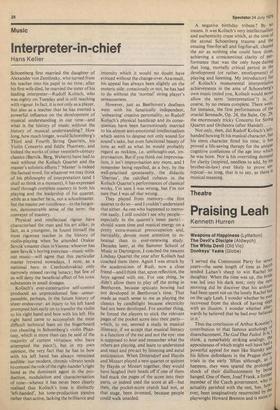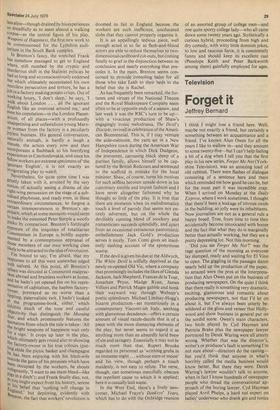Praising Leah
Kenneth Hurren
Weapons of Happiness (Lyttelton) The Devil's Disciple (Aldwych) The White Devil (Old Vic) Donkeys' Years (Globe)
'I served the Communist Party for seven years—the same length of time as Jacob tended Laban's sheep to win Rachel his daughter. When the time was up, the bride was led into his dark tent; only the nest morning did he discover that his ardours had been spent not on the lovely Rachel but on the ugly Leah. I wonder whether he ever recovered from the shock of having slePt with an illusion. I wonder whether afterwards he believed that he had ever believed in it.' Thus the conclusion of Arthur Koestler'sf contribution to that famous anthologY disenchantment, The God That Failed. It think, a remarkably striking analogy, We appositeness of which might well have had ad powerful appeal for men like Slansky his fellow defendants in the Prague show.; trials in the early 'fifties although, as IA happens, they were spared the prolonge' shock of their disillusionment by being hanged. One of them, Josef Frank, a forrrie member of the Czech government, NO° actuality perished with the rest, has, boo; ever, been imaginatively resurrected by til, playwright Howard Brenton and is more dI less alive—though drained by his experiences SO dreadfully as to seem almost a walking corpse—as the central figure of his play, Weapons of Happiness, the first new work to be commissioned for the Lyttelton auditorium in the South Bank complex.
In Brenton's fancy, the wretched Frank has somehow managed to get to England Where, still numbed by the cryptic and murderous shift in the Stalinist policies he had so long and so conscientiously endorsed but which ultimately necessitated his own merciless persecution and torture, he has a
Job ma factory making potato crisps. Out of Working hours, 'I don't sleep,' he says, 'I Walk about London . . all the ignorant English like an overcoat around me,' and even his copulation—in the London Planetarium, of all places—with a profoundly unappetising and unfastidious young Marxist woman from the factory is a peculiarly Joyless business. His general conversation, naturally enough, is hardly a laugh a Minute, the action every now and then incorporates a flashback to his horrifying experiences in Czechoslovakia, and since his f,ellow workers are extreme specimens of 'the !goorant English', it is not exactly an Invigorating play to watch. Nevertheless, for quite some time I was greatly taken with it, arrested by the very 11.°1i0n of actually seeing a drama of the r!gbt-wing persuasion on the stage of a subsidised playhouse, and ready even, in these extraordinary circumstances, to forgive a certain intemperateness in Brenton's approach, which at some moments would seem tn. make the esteemed Peter Simple a woolly Pink° by comparison. Brenton's forthright exPosure of the iniquities of totalitarian Communism in Europe is boldly supplemented by a contemptuous appraisal of t.11!)se members of our own working class likely to be attracted to the idea of revolution. I'm bound to say, I'm afraid, that my resPonses to all this were somewhat edged With naiveté. At this point, all Brenton's spleen was directed at Communist malpractkes abroad and brainless workers at home, and he hadn't yet opened fire on his representative of capitalism, the hapless factoryWrier, portrayed as no worse than a tIPPling, paternalistic twit. I hadn't looked at the programme-book, either,' which exhibits much of the tone and careful ne,bJectivity that distinguish the Morning °tar, and which prominently features the !Notation from which the title is taken: 'All ,the bright weapons of happiness wait only sign.' It crops up later in the play, w.,bich ultimately gets round also to showing lune factory-owner in his true colours (putking aside the picnic basket and champagne "e has been enjoying with his bitch-wife °Lutsicle the gates of his premises which have I .ueep occupied by the workers, he shouts ndignant ly, want to see them bleed—like art igs in a ditch'); and Frank finally dies, not, s You might expect from his history, serene Ell his belief that 'nothing will change in angland,' but deploring, evidently with renton, the fact that workers' revolution is
doomed to fail in England because the workers are such inefficient, uneducated slobs that they cannot properly organise it. It is an appallingly tedious piece, well enough acted in so far as flesh-and-blood actors are able to reduce themselves to twodimensional cardboard cut-outs, but coming fatally to grief in the disjunction between its conclusion and nearly everything that precedes it. In the main, Brenton seems concerned to provide consoling balm for all those who take Leah to their beds in the belief that she is Rachel.
As has frequently been remarked, the fortunes and virtues of the National Theatre and the Royal Shakespeare Company seem often to be at opposite ends of a seesaw, and last week it was the RSC's turn to be up— with a vivacious production of Shaw's engagingly ironic melodrama, The Devil's Disciple, revived in celebration of the American Bicentennial. This is, if I may venture the aide-memoire, the yarn set in a New Hampshire town during the American War of Independence in which Dick Dudgeon, the irreverent, carousing black sheep of a puritan family, allows himself to be captured by the British Redcoats and sentenced to the scaffold in mistake for the local minister. Shaw, of course, turns his motives for such selfless heroism upside-down in his customary nimble and impish fashion and I have never altogether fathomed why he thought so little of the play. It is true that there are moments when its melodramatics touch a level of parody that seems not entirely advertent, but on the whole the devilishly cunning blend of mockery and romanticism succeeds splendidly, and apart from an occasional extraneous pantomimic embellishment Jack Gold's production serves it nicely. Tom Conti gives an insolently dashing account of the eponymous scamp. If the devil is given his due at the Aldwych, The White Devil is wilfully deprived at the newly re-opened Old Vic, where a company that promisingly includes the likes of Glenda Jackson, Jack Shepherd, Frances de la Tour, Jonathan Pryce, Madge Ryan, James Villiers and Patrick Magee gabble and honk their wayward way through Webster's poetic splendours. Michael Lindsay-Hogg's bizarre production—set mysteriously in a contemporary Visconti-ish Italy, seething with glamorous decadence—offers a certain amount of visual razzle-dazzle that is of a piece with the more dismaying elements of the play, but never seems to regard it as anything more than an absurdly lurid brew of sin and savagery. Essentially it may not be much more than that. Rupert Brooke regarded its personnel as 'writhing grubs in an immense night ... without stars or moon' and his view, though perhaps a touch maidenly, is not easy to refute. The verse, though, can sometimes mercifully obscure the repellent cause to which it is applied; here it is casually laid waste. In the West End, there's a lively newcomer, Michael Frayn's Donkeys' Years, which has to do with the Oxbridge reunion
of an assorted group of college men—and one quite sporty college lady—who all came down some twenty years ago. Stylistically a curious hybrid, proceeding from high and dry comedy, with witty little donnish jokes, to low and raucous farce, it is consistently funny and should keep its excellent cast (Penelope Keith and Peter Barkworth among them) gainfully employed for ages.



































 Previous page
Previous page